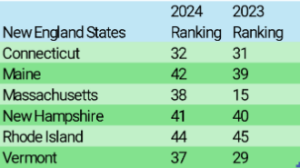Massachusetts Affordability and Competitiveness Ranking is in Freefall
Each year, CNBC ranks the 50 states on 10 broad categories of competitiveness using 128 metrics. The categories are weighted based on how frequently states use them as a selling point in economic development and marketing materials. In other words, states are judged on the attributes they use to sell themselves. For example, Massachusetts most likely touts its talented workforce, public education system and quality of life as key attributes.
| 2024 Category Ranking | Weight | MA 2024 Ranking | 2023 Category Ranking | Weight | MA 2023 Ranking | Drop in Places | |
| 1 | Infrastructure | 17% | 44 | Workforce | 16% | 34 | 31 |
| 2 | Workforce | 15% | 38 | Infrastructure | 15.60% | 13 | 4 |
| 3 | Economy | 14% | 40 | Economy | 14.40% | 26 | 14 |
| 4 | Quality of Life | 13% | 9 | Life, Health, Inclusion | 14% | 8 | 1 |
| 5 | Cost of Doing Business | 11% | 49 | Cost of Doing Business | 11.60% | 49 | 0 |
| 6 | Tech & Innovation | 10% | 3 | Tech & Innovation | 10.80% | 1 | 2 |
| 7 | Business Friendliness | 10% | 40 | Business Friendliness | 8.60% | 19 | 21 |
| 8 | Education | 5% | 2 | Education | 5% | 3 | 1 |
| 9 | Access to Capital | 3% | 9 | Access to Capital | 2% | 3 | 6 |
| 10 | Cost of Living | 2% | 48 | Cost of Living | 2% | 47 | 1 |
CNBC’s 2024 rankings are a wake-up call for Massachusetts policy makers. The Commonwealth plummeted 23 places, from 15 to 38 in its overall rankings. No other state experienced this freefall in competitiveness. New England did not fare well, with none of the six states in the top tier, but Massachusetts stands out for the steepness of its decline. Rhode Island’s position improved slightly from 45th to 44th, while Connecticut slightly declined from 31 to 32 and New Hampshire dropped from 40 to 41. Maine dropped three places, going from 39 in 2023 to 42 in 2024, and Vermont slid from 29th to 37th.

There are several observations worth noting. Most striking about Massachusetts is the divergence in its rankings among the 10 categories. It reminds me of the line about the girl in the poem “Jemima “by Henry Wadsworth Longfellow “when she was good, she was very, very good and when she was bad, she was horrid.” Where Massachusetts does well – education, tech & innovation, quality of life and access to capital – it excels, but where we do poorly – cost of doing business, cost of living, and infrastructure – we are near rock bottom.
The report is a business ranking and, therefore, the categories are weighted by their relative importance to businesses. It is noteworthy that infrastructure tops the list. In Massachusetts, we tend to focus on transportation as a way to move people, with an emphasis on fixing the MBTA, and not on the importance of moving goods and facilitating commerce. Infrastructure surpasses the cost of doing business in importance, though Massachusetts ranks in the bottom quintile on both counts.
Workforce is another key component of the rankings and Massachusetts has regressed quite a bit in its year-over-year score on this measure. In 2023, Massachusetts ranked 13th; Massachusetts now ranks 38th, the single biggest drop of any category. This is surprising and disappointing given the sizable investments the state has made in its workforce development and training programs over the past few years.
Massachusetts has also become less business friendly since 2023, dropping 14 places over the past 12 months. Passage of the income surtax may be partially to blame, since the 80 percent tax rate increase impacts many unincorporated businesses that are subject to tax under the personal income tax code. Also at play are the many favorable changes other states have made to their tax code. Nine states adopted more favorable tax laws affecting businesses in 2023.
Education, the attribute considered Massachusetts’ greatest strength, has improved slightly, moving from third to second. We need to be vigilant in maintaining our competitive edge by strengthening the k-12 curricula to ensure greater student proficiency and advances in academic achievement. In this context, ensuring that Massachusetts retains MCAS as a graduation requirement and to measure progress becomes critically important.
The categories where Massachusetts fares most poorly – the cost of doing business and cost of living – are the ones that are most affected by and resulting from government policies. High minimum wages, electricity rates, unemployment insurance premiums, health care costs and tax burdens are the result of public policies that add regulatory and compliance costs, mandate more generous benefits, raise tax rates and otherwise increase the overall cost structure of operating a business. The good news is that policies to reduce these burdens can have an immediate positive impact if the government chooses to address them.
This CNBC report is one of many comparative analyses of the states. Massachusetts scores much higher in some other such studies, making it easy for some public officials to dismiss these particular findings as inaccurate or an anomaly. However, there is a growing body of evidence that confirms a change in Massachusetts economic strength – outmigration trends, business surveys, and data from academia, government and other credible sources.
Others may point to the pending economic development plan, which will make sizable investments in several programs, as proof that Massachusetts lawmakers are actively addressing the shortcomings highlighted in CNBC’s rankings. But that is only a partial solution at best. The pending economic plan builds on current strategy to a large extent. If that were working, the drop in ranking would not be so precipitous.
Instead, the CNBC findings should serve as a wake-up call to the idea that our competitive position needs ongoing attention and new solutions. More focus on maintaining, expanding and improving public infrastructure must be a top priority and solutions must be implemented with urgency. Ensuring that the workforce development programs are delivering the skilled workers we need by imposing greater accountability for outcomes through clear metrics and frequent reporting requirements is another critical priority. Taking measures to reduce the costs of operating for all businesses, rather than targeted investments earmarked for a few industry sectors, must be incorporated into the current economic development plan. Reducing electricity rates, lowering healthcare costs, restructuring unemployment benefits, streamlining tax compliance burdens and eliminating onerous tax provisions such as the surtax on Subchapter S corporations and the non-income measure of the corporate excise are all policies that would improve the cost structure for a wide spectrum of businesses and should be incorporated into the state’s economic development strategies.
Given the widespread acknowledgement that affordability and competitiveness are paramount to the state’s future economic well-being, the CNBC rankings serve as a much needed reminder of how laser focused the Commonwealth needs to be on making progress on both.



